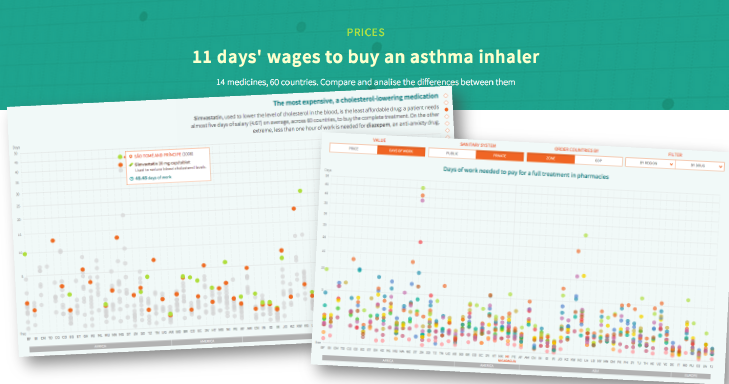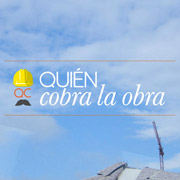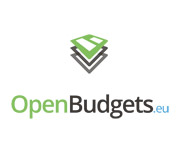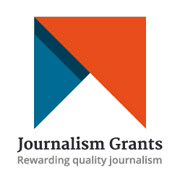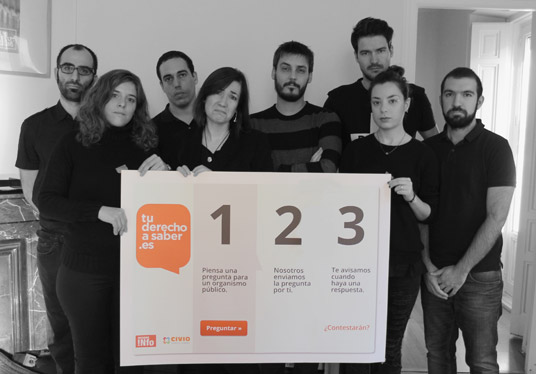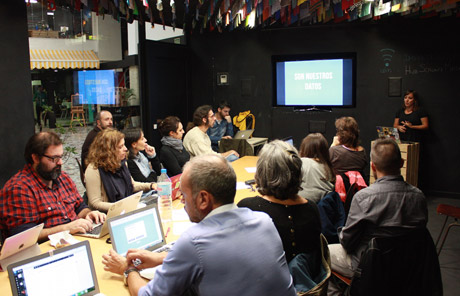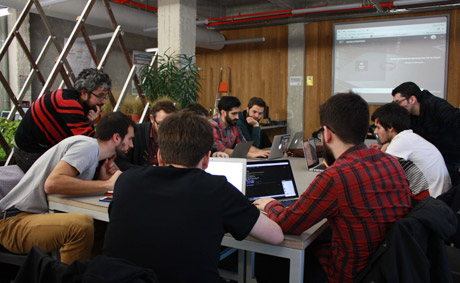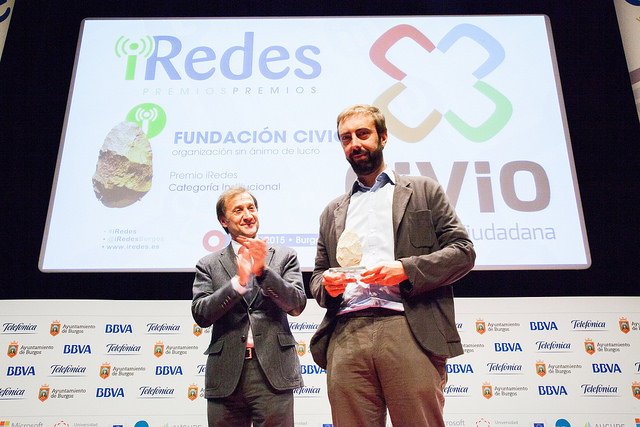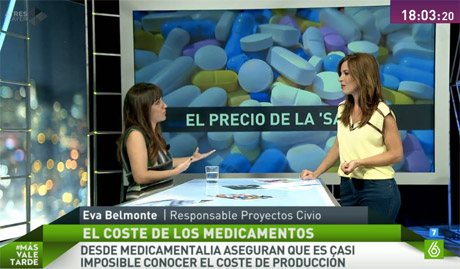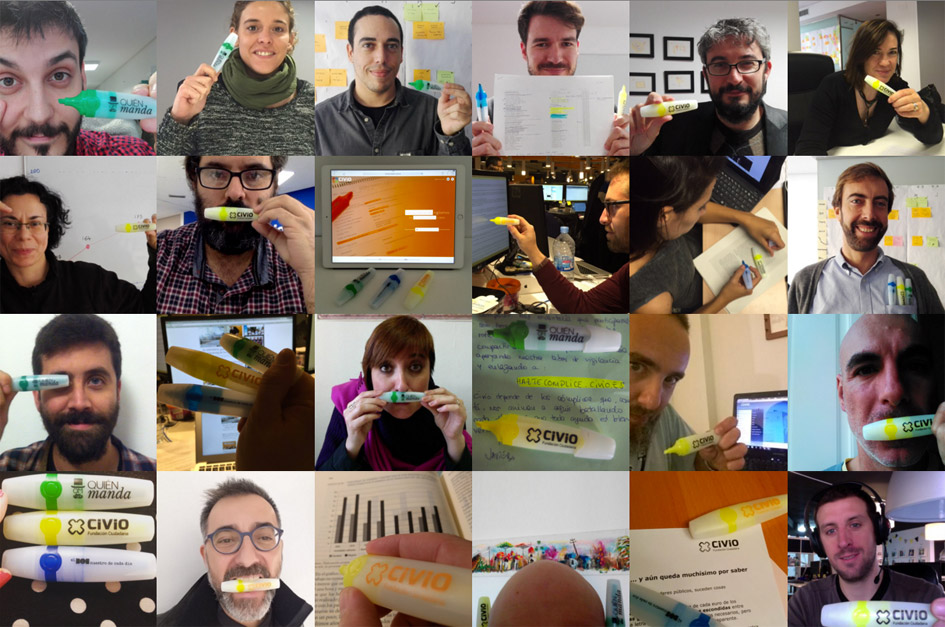In 2015, our fourth financial year, we once again delivered a surplus (€ 67,902 approximately, in accounting profits), consolidating the sustainability of the foundation for one more year. The income generated for 2015 implied over twice as much as last year (around € 249,461, when it amounted to € 99,212 that we declared in 2014, following a cash approach), although expenses also escalated (some € 184,670, compared to the € 92,932 expended in the previous year).
In 2015, we have experienced an increase in labor costs (which constituted 75% of the organisation's expenses) in 2015. Civio has become consolidated and grown, as our stable payroll team has added a permanent editor, a service manager as well as one person in charge of partnerships and advocacy (after the person formerly in charge opted out). The team is growing following the requirements of national and European projects, public service provision and our will to do better and more journalism.
Our payment scheme for 2015 is based on three elements:
- Three wage levels, on a per annum gross basis: a basic salary of € 16,800, an intermediate level of € 18,500 and a top level of € 21,000. This wage scale has been revised upward for 2016.
- A variable bonus depending on each one's contribution to common goals, totalling € 10,000 gross for the operations team.
- An additional distribution of income generated through activities based on a high level of personal and direct contact, like classroom-based training delivery.
2015 income (€ 249,461) arose from:
-
Private donations (€ 21,746, 9% out of total income).
After closing the last day of 2014 with a symbolic and very significant number of 100 collaborators with periodical monthly donations supporting the foundation's activities with their effort, by December, 31st, 2015 we were closing with 207 Civio's collaborators. The income gained from donations is very similar to those from the former years (€ 19,064 for 2014, € 21,746 for 2015). The difference lies in the fact that this year we have not launched any crowdfunding campaign linked to projects. Instead, we combined the efforts and brains of the whole team to prepare a modest agent recruitment campaign in the weeks prior to 2015 Christmas. Using the thinnest budget and totally out of our own resources, haztecomplice.civio.es spread on social networks thanks to active engagement of dozens of donors and supporters, and we made the set goal: to reach over 200 collaborators to support our work on a monthly basis. In December we celebrated our annual agent meeting.
-
Professional service delivery (€ 67,324, 27% out of total).
Services provided to the public sector, based on very specialised knowledge and aimed at bringing citizens closer to their administration and decisions, have gained wide acceptance during 2015, especially toward the end of the year. This year, we have deployed transparency projects based on the platform ¿Dónde van mis impuestos? (“Where do my taxes go?”) for the local authorities of Móstoles (Madrid) and Rubí (Barcelona), and for the last quarter we have been fostering this line of work. As an outcome of this drive, in 2016 we are providing technical support to a number of governments both local and regional to innovate in matters of transparency. Among these, we find Barcelona, Santiago de Compostela and Castellón de la Plana.
We must add the training taught for public sector professionals to these services (to Castilla y León Government staff) as well as for the media and several Journalism postgraduate programmes. For the third consecutive year, we have provided for consulting services to the BBVA bank Centre for Innovation, by creating content related to our working areas for their website. We have also contributed to mapping stakeholders and influencers within food industry and sugar consumption for Veterinarios sin Fronteras (Vets without Borders).
-
Institutional support (€ 160,390, 64% out of total income).
These still arrive from outside the country only. In 2015 we were supported by Open Society Foundations in order to actively drive transparency and accountability in Spain, by the Collective enHanced Environment for Social Tasks European programme in order to develop the Onodo platform and be able to launch it during the first half of year 2016, and from the European Journalism Centre, that endowed us with a Journalism Grant in order to extend the Medicamentalia project for the investigation on access to vaccines.
Towards the end of 2015 and throughout 2016, we have summed up our participation in the European Consortium OpenBudgets. Our participation within the project is more prominent throughout this year than in the past, which is also when we will incur the accounting expenses associated with our work.
YOU CAN DOWNLOAD OUR ACCOUNTS IN .XLS FORMAT HERE
...a more self-demanding character...
Since the January 1st, 2015 we have abandoned the cash approach and we have started applying accountancy on an accrual basis, which is more suitable for a more established organisation that consolidates and with projects that are constantly growing and expanded throughout various exercises. This allows us to reflect generated income and expenses associated to financed projects in a more coherent and consistent way for every fiscal year.
Having carried out the first external audit on our organization's 2015 accounts, in June of 2016, a voluntary practice to improve and learn —We have decided to present our adjusted accounting once again at the end of July, explaining the modifications derived from the change in our accountability from a cash approach to an accrual approach. Unifying our accounting policies has required the modification of our annual accounts in 2014. Everything is correctly reflected in the accounts that you are able to download from this report.
In the 2014 accounts we found a surplus of 6.279 euros following a cash basis. That is, counting the bills at the time of issuance and the agreements at the time of their signing. To better reflect our accounting situation, in addition to the external audit’s recommendation, we have also translated the benefits from 2014 to 2015. For example, the provision obtained for our Medicamentalia project has been accounted for in full in 2014 (when the financing agreement was signed) rather than in 2015 (when the project was realized), as befits following an accrual basis.
Another example: in our 2015 balance, for the first time, the debtors short and long term have been included, something that did not we account for previously, as it was income committed to within the next year. Short-term debtors (151,048 euros), we can find income that was committed to in 2016 to projects already approved by the European Commission (the provision of CHEST to create Onodo and Openbudgets), the European Journalism Centre (to expand Medicamentalia) and the Open Society Foundations. In long-term debtors (62,593 euros), so far, we only find the European Commission as a debtor within our Openbudgets project, which will extend until 2017.
In addition, this year we have begun to meet the corporate tax as the development activity of our visualization applications, which are aimed at enhancing the government transparency, our application Where Do My Taxes? at local and regional levels, has been an auxiliary economic activity, whose net turnover for the year 2015 has exceeded the 20 by 100 of our Foundation’s total revenues-- a step forward in order to achieve more Independent economic stability.
The result of the audit, best reflects our foundation's transparency, consolidation and financial health, as well as our efforts to increase accountability with the highest level of demand.
...on a foundation for growth
All through 2016 we will go on collaborating with Open Society Foundations in order to develop political advocacy and training projects. During the first half of the year we count on having a high level of activity within the CHEST – Call 2 programme in order to launch Onodo, and in 2017 we will execute our workloads for the OpenBudgets programme, as we have previously explained further.
These past and future endorsements allow us to state that we count on approximately a 60% of our financing guaranteed for 2016. This growing stability has allowed on one hand to widen the team and, on the other, to comply with our 2015 expense budget, according to what we stated on our 2014 Annual Report. The expense scenario for 2016, mainly due to the expansion of our task force and to the foreseen salary and social contribution rise, reaches around € 366,000. This reflects our constant desire to improve and to assign more human and technological resources to our projects. The new hirings as foreseen include our director's paychecks, after four years of unpaid efforts to Civio, as well as a programmer and a journalist, within the terms allowed by the Foundations Authority.
We are committed to our donors and followers, and we are totally devoted to make sure we do not let them down regarding any of our areas of action. We will follow our current lines of work by updating active projects, as well as continuing to surprise everyone with new initiatives as Medicamentalia - Vaccines, Quién cobra la Obra, Onodo and OpenBudgets.
We remind you that our accounting has been public since 2012 and are available here.
Objective as foreseen on the 2015 Action Plan:
Our forecast totalled € 234,000 income and € 204,000 expenses, an increase of our social basis, the provision of highly specialised services in training and consulting, as well as new institutional support.
